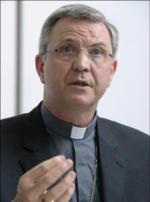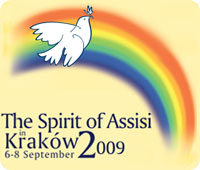
Katholischer Bischof, Belgien
|
UNITY OF CHRISTIANS. SO THAT THE WORLD MAY BELIEVE.
On January 4th, 2009, I have been consecrated the new bishop of Antwerp in Belgium. Be-fore becoming a bishop, I worked for nearly twelve years in Rome, as a member of staff at the Pon-tifical Council for Promoting Christian Unity. In that function, I was mainly dealing with ecumen-ism in the Middle East. Moving to Antwerp, I was pleased to meeting again many members of different Churches and World Religions.
The city of Antwerp counts around 458.000 inhabitants. According to recent statistics, around 77.000 of them are Muslims, which means around 16,6 % of the total population of the city. They come from different continents and countries, mainly from the Maghreb and from Turkey. There also is a large Jewish community, which counts between 10.000 and 20.000 members. Ant-werp is well know for having one of the biggest communities of orthodox Jews outside Israel. The presence of both Jewish and Muslim faithful is most evident in the city. People can openly wear their traditional vestments, they can use their languages and freely practice their religion. Civil authorities try their best for answering the social needs of all religious communities and favouring their integration into social life. Friendly relations among Christians, Muslims and Jews are indeed of capital importance for the future of our city. Fortunately, local relations among faithful of dif-ferent religious are generally peaceable and harmonious. Nonetheless clashes among different groups or manifestations of anti-Semitism can occasionally happen and watchfulness thus remains necessary. International conflicts immediately impinge on the relations between members of dif-ferent religious groups living side by side in the West. It is our hope that working for friendly rela-tions in our city may be helpful to strengthen a climate of trust and dialogue among the “children of Abraham” worldwide. For me as a bishop and my staff, an important challenge will be to meet the religious leaders of both the Jewish and the Muslim communities, to establish friendly relations with them and to open conversations on religious issues of common interest. How to live a religious life in a secular society as ours? How to transmit faith and prayer life to our children and youngsters? How to witness to God the Almighty in a way that is sincere and transparent, though not aggressive nor fanatic. These questions are of vital importance for the future of religion and of civilisation in our region. They open new and interesting ways for dialogue and sharing among the three mono-theistic world religions.
Secondly, many Christian communities of Orthodox and Reformed origin are also present in our city. Their presence is largely related to the port of Antwerp, which is the fifth biggest seaport in the world. Several orthodox and protestant churches have indeed established parishes and pas-toral ministry in Antwerp to meet the pastoral needs of their seafarers. Today, these pastoral minis-ters are working in an ecumenical team, so that together they can better serve the seafarers and their pastoral needs. Among the mainline Churches good relations have been established and frequent meetings take place. Besides the mainline churches, many smaller Christian communities are also active in the city of Antwerp. They are often related to evangelical or pentecostal groupings of for-eign origin. They mostly recruit among immigrants from Africa or Asia. Ecumenical relations with these free churches are not obvious. This is a second challenge I see for myself and my staff: to foster good relations and pastoral cooperation among the Christian communities that are present in our city. Unfortunately ecumenism has lost a great deal of its energy. Too often, ecumenical meetings or events have become a matter of repeating the same activities for the same persons on the same days, with few creativity and enthusiasm. There is room for an examination of conscience: what do we make today of Christ’s prayer “that all may be one”. Division among Christian remains one of the main obstacles in fulfilling our mission: gathering all peoples into the one body of Christ. The Catholic Church hails an ‘ecclesiology of communion”, knowing that there is more that unites Christians than what divides them. But how do we gradually translate that ‘ecclesiology of communion’ into ecclesial practice? It would be an enormous help for our mission if we could witness to Christ together, if we could pray and celebrate together, if we could develop common pastoral initiatives, if we could find shared answers to the major social and ethical challenges of today. How can Christians be “salt in the yeast and light on the candle” if not by brotherly sharing and solidarity, by searching together how to proclaim the Gospel in a secular society, by finding new ways of celebrating together the mystery of faith. Do we believe that through baptism we became truly and really brothers and sisters in Christ? If so, working for Christian unity should become a main concern again.
Finally, we are happy to welcome in our city an increasing number of Catholic communities of foreign origin, particularly from Africa and from Asia. These communities are rapidly growing, thanks to an ongoing though complicated movement of immigration. Most of these communities are very lively and active. They celebrate Sunday Eucharist with commitment and devotion, they bring their children to church and to catechesis, they nurture real bounds of solidarity among their families. These communities are becoming a vital and most interesting part of our local church. The South and the East are not far away: they are present among us, as a gift and also as a chal-lenge. As a gift because they bring to our local Christian community something fresh and new in terms of prayer, spirituality, ethics and community life. As a challenge because they reveal some-thing of our own weakness and need. In past centuries, we have learned to give from our abun-dance, to send missionaries and all kinds of support to other continents. Now that we have be-come quite poor in faith and spirituality, will we be able to receive from them? Are we ready to welcome Christians from other continents, to integrate them into our local churches and to learn from them how to love God and our brothers? This is a third mission I see for myself and my staff: to welcome the Catholic communities from other countries and continents into our local church and to take advantage of their energy and commitment for the spiritual renewal we need.
Among the people working for Christian unity and interreligious dialogue in Antwerp, a prominent role is played by the local Community of Sant’Egidio, one of the most important com-munities of Sant’Egidio worldwide. I am proud of having that community in our city and wish to thank them for their precious efforts to bring together people of all religions and cultures in a broth-erly community.
+ Johan Bonny
Bishop of Antwerp (Belgium)
|

